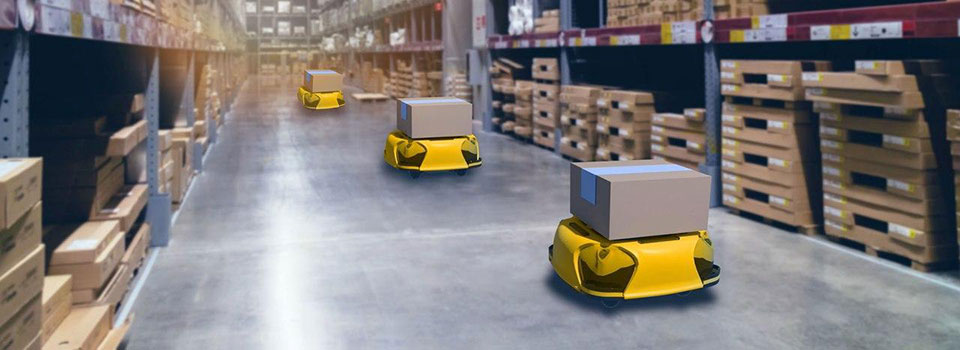The future is here – a look at 5 ways that Artificial Intelligence (AI) is revolutionizing logistics.
To successfully manage demands of the digitally-powered market, you can’t do without AI. Basically, the main goal of AI implementations is to automate time-consuming actions and save money. Logistics Software Development services streamline logistics processes and make them more cost-efficient.
The scope of artificial intelligence is constantly growing throughout any industry. According to the latest McKinsey Global Survey, the use of AI in standard business processes grows by 25 per cent each year. In addition, most CEOs of businesses that have implemented AI state that it has provided the rise in revenue. Also, 44 per cent of the respondents report that using artificial intelligence has cut down costs.
Without a doubt, the role of AI tools for logistics is huge. In this article, we’ll take a closer look at five aspects of logistics that are being completely revolutionized by AI. Interested? Let’s dive in!
Needless to say that in logistics, demand prediction is a key to efficiency. In other words, if you know what to expect, you’ll be able to modify your resources in order to focus on the areas of higher demand. That means lower operational costs, fewer risks and producing optimal solutions on time.
Plus, AI tools utilize satellite maps and real-time traffic data to work out the best route and they can also identify when a vehicle needs servicing. What is more, AI forecasting is able to predict imminent trends based on different factors like weather or real-time sales. This all helps to provide better service and cut down logistics expenses.
Efficient logistics is all about making fast and rational decisions. It can sometimes be a challenging task to choose the best route or carrier and draw up an optimal schedule if you’re short of time. In addition, there’s too much data that you have to take into account. Fortunately, we live in the 21st century and can entrust this job to artificial intelligence.
AI can process huge volumes of data within a second and instantly provide you with the best solution. Amazingly, software solutions for logistics can replace loads of paperwork and save time. Plus, artificial intelligence is totally accurate with calculations and it never misses out any details, while there are chances of errors when this type of work is done by a human.

Shutterstock – Author: MONOPOLY919
In logistics, artificial intelligence has gone much further than just making predictions and planning. Many businesses have already started implementing AI in warehousing and now they successfully delegate repetitive tasks to robots. Automated solutions greatly facilitate processes that demand a big deal of physical work. It might sound futuristic a few decades ago, but robots are already here. They can perform a variety of tasks like moving, locating and tracking inventory inside warehouses. With the help of computer vision, robots effectively deal with identifying, counting, picking and manipulating goods. It goes without saying that robots are irreplaceable when you work with oversized packages.
Robots use machine learning to autonomously make decisions and immediately take actions. Artificial intelligence accumulates knowledge based on human decisions, however, robots perform less complicated tasks with the help of robotic process automation. For instance, a robot can place rarely ordered items at the bottom and frequently accessed items on the top. This significantly saves time and makes it possible to process more orders.
In addition, robots can substitute humans in accessing shipping information, filling in web forms, processing invoices and distributing data to the right database. To top it off, robots greatly assist in carrying out quality control.

Shutterstock – Author: Mike Mareen
It’s obvious that safe and efficient delivery is one of the core principles in logistics. And you’re missing out a huge opportunity if you don’t utilize AI to streamline the delivery process. Although vehicles aren’t fully autonomous so far and they still need human supervision, the AI can greatly facilitate goods transportation.
First and foremost, with high-tech driving assistance, you’re going to save costs. For instance, artificial intelligence can control and manage multiple trucks so that they move in a formation closely following one another. This method helps to considerably cut down fuel consumption.
Secondly, highway autopilot is an AI development that enables autonomous driving on the highway. With the help of cameras, autopilots identify roadways, moving and immobile objects and regulate the steering according to this data. AI can adapt the speed of the truck to the traffic flow, observing regulations such as the speed limit and the required distance to the vehicle ahead. This undoubtedly makes the drivers’ work easier and more efficient, and helps reduce the accident rates.
Beyond that, smart roads are an innovation worth paying attention to. Highways with solar panels are the most impressive example. Solar panels produce electricity that is used to power LED lights. First off, the solar panels prevent roads from getting slippery in winter. What’s more, the LED lights notify the drivers about the road conditions ahead. For this, AI uses the data provided by fiber optic sensors that are able to identify the volume of traffic. It can sound even more incredible, but the highway sensors are also able to detect accidents and alert the emergency services.
Positive customer experience is the key to growth of any business. It inspires loyalty, boosts customer retention, and encourages brand promotion. In logistics, customer experience is even more crucial, as we are talking about long-term contracts and complex global supply chains. One of the AI solutions that can significantly enhance customer experience is utilising voice assistants. Voice assistants are able to provide the user with the tracking data and give instructions in case some issues occured.
All in all, artificial intelligence helps logistic companies work faster and more efficiently. The future of AI-powered logistics looks highly promising. AI successfully streamlines the core logistic processes, eliminates repetitive tasks, increases the quality of human work and provides for quick solutions. Software solutions for logistics are the best option when you focus on safety and accurate predictions. It’s high time to give AI a go if you want to quickly respond to the dynamic needs of the market and achieve the best results in logistics.
Scott Ellyson, CEO of East West Manufacturing, brings decades of global manufacturing and supply chain leadership to the conversation. In this episode, he shares practical insights on scaling operations, navigating complexity, and building resilient manufacturing networks in an increasingly connected world.